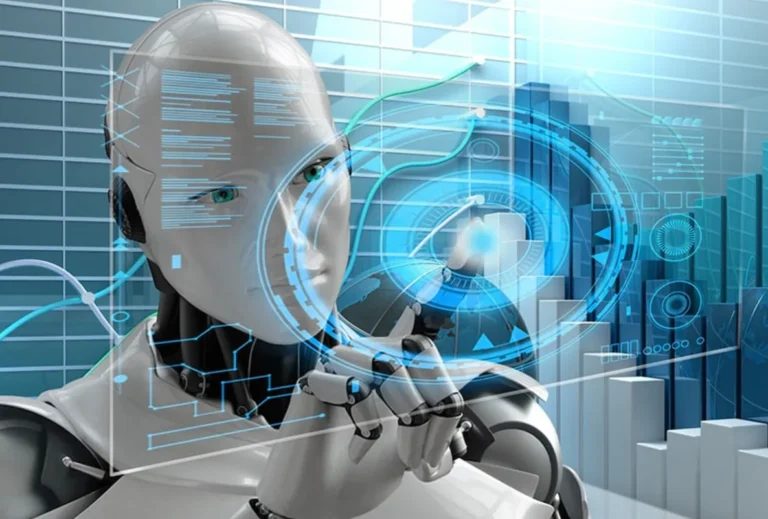In the last decade, Artificial Intelligence (AI) has rapidly evolved from a futuristic concept into a vital tool for businesses. By leveraging machine learning, natural language processing, and automation, AI has become integral to transforming modern business operations. From enhancing customer service to optimizing logistics, AI is reshaping how businesses operate, compete, and grow. This article explores the different ways AI is transforming modern business operations and the potential future impacts of this technological revolution.
Understanding Artificial Intelligence in Business
Artificial Intelligence refers to the ability of machines to mimic human intelligence, learning from data, making decisions, and even predicting future outcomes. In business, AI applications are vast, ranging from customer support chatbots to predictive analytics for sales forecasting. By analyzing large data sets and drawing actionable insights, AI helps businesses make informed decisions, streamline processes, and reduce costs. As businesses become increasingly data-driven, AI’s role becomes more significant, enabling faster and more precise decision-making.
Enhancing Customer Service and Engagement
One of the most prominent uses of AI in business is customer service. Chatbots, powered by AI, can handle customer inquiries 24/7, reducing the need for human intervention and providing instant responses. These AI-driven chatbots are also becoming more sophisticated, understanding customer sentiment and using past interactions to tailor responses. Additionally, AI can predict customer needs by analyzing their behavior patterns, making it possible to recommend products or services in real-time, thereby enhancing customer satisfaction and boosting sales.
Personalized experiences are another key area where AI has made significant strides. By analyzing customer data, such as browsing history and purchasing behavior, AI algorithms can create targeted marketing campaigns that appeal to individual preferences. This level of personalization not only increases engagement but also improves customer loyalty, as consumers appreciate businesses that understand and anticipate their needs.
Streamlining Operations Through Automation
AI-driven automation is revolutionizing operational processes across various sectors. Routine and repetitive tasks, such as data entry, invoicing, and order processing, can now be managed with minimal human intervention. This automation reduces the chance of errors, enhances efficiency, and allows employees to focus on more strategic tasks that require human expertise.
In manufacturing, for instance, AI-powered robots can perform complex tasks on the assembly line, increasing production speed and consistency. The retail sector also benefits from automation through AI-driven inventory management systems that monitor stock levels in real-time and automatically reorder items when needed. Companies like https://www.fullexglobal.com/, implement these advanced solutions to reduce operational costs and help businesses operate seamlessly, even with minimal human oversight.
Data-Driven Decision-Making and Predictive Analytics
One of AI’s most powerful capabilities is its ability to process and analyze massive amounts of data quickly. Businesses generate vast amounts of data every day, from customer interactions to supply chain logistics.AI-powered data analytics tools can sift through this information to identify patterns, trends, and insights that might be invisible to the human eye. Platforms like Hevo Data streamline data integration and analytics, enabling businesses to seamlessly consolidate information from various sources for actionable insights.
Predictive analytics, an AI-driven process, uses historical data to forecast future events. For example, retail companies can use predictive analytics to anticipate demand for specific products based on seasonal trends, helping them optimize inventory and avoid stockouts. Similarly, financial institutions use AI to detect fraudulent transactions by analyzing anomalies in spending patterns. With AI-driven insights, businesses can make more informed decisions, reducing risks and seizing new opportunities.
Improving Human Resources and Talent Management
AI is also transforming how businesses manage their workforce. In recruitment, AI-powered platforms can screen resumes, evaluate candidates’ skills, and even predict their fit within a company’s culture. This automation not only speeds up the hiring process but also removes unconscious bias, as AI systems are designed to focus solely on objective criteria.
Moreover, AI-driven tools assist in employee engagement and retention. By analyzing data on employee performance, satisfaction surveys, and turnover trends, AI can identify at-risk employees and suggest interventions to improve retention. Additionally, AI-powered training programs, often personalized to individual learning styles, help employees acquire new skills and stay competitive in a rapidly changing business landscape.
Transforming Marketing Strategies
AI has had a profound impact on marketing by enabling highly targeted, data-driven strategies. Traditional marketing often relied on broad campaigns, but AI allows for hyper-personalized marketing that speaks to individual preferences and behaviors. With AI, marketers can segment their audience more accurately and create customized messages that resonate on a personal level.
Machine learning algorithms also play a critical role in content marketing by analyzing customer preferences and trends to suggest the most relevant content. Predictive analytics can identify potential leads and help convert them into loyal customers. Moreover, AI-powered tools track campaign performance in real-time, allowing marketers to make adjustments and improve return on investment (ROI).
Enhancing Supply Chain and Inventory Management
AI has made supply chain management more efficient and resilient. AI algorithms optimize routes, reduce delivery times, and even predict potential disruptions by analyzing weather patterns, geopolitical factors, and other variables. These capabilities allow businesses to mitigate risks and ensure a steady flow of goods and services. In cities like Tampa, many businesses rely on managed IT services in Tampa to keep their AI-powered systems running efficiently and securely.
Inventory management is another area that benefits significantly from AI. Smart inventory systems use AI to monitor stock levels and predict when to reorder items, minimizing the risk of overstocking or stockouts. This precision not only cuts costs but also reduces waste, contributing to more sustainable business practices.
Strengthening Cybersecurity
As businesses embrace digital transformation, cybersecurity becomes a critical concern. AI enhances cybersecurity by identifying and responding to threats faster than traditional methods. AI systems can analyze data to detect unusual activity, such as unauthorized access attempts or unusual data transfers, and respond immediately to contain potential breaches.
Machine learning models can also learn from previous security incidents, improving their ability to prevent future attacks. By staying one step ahead of cyber threats, businesses can protect their data and maintain customer trust, which is essential in today’s digital world.
The Ethical Implications of AI in Business
Despite the advantages, the integration of AI into business operations raises ethical concerns. Issues such as data privacy, job displacement, and algorithmic bias need to be addressed to ensure responsible AI use. For instance, while AI can improve efficiency, it may also lead to job losses in roles that are highly automatable. To counter this, businesses must invest in upskilling programs that prepare employees for new, AI-related roles.
Moreover, AI algorithms can inherit biases present in training data, leading to unfair outcomes. For example, biased hiring algorithms may unintentionally favor certain demographic groups. To address this, businesses need to prioritize transparency and accountability, ensuring that AI systems are regularly audited for fairness and inclusivity.
The Future of AI in Business Operations
The future of AI in business holds exciting possibilities. As AI technology advances, businesses can expect even more personalized customer experiences, efficient operations, and enhanced decision-making capabilities. Innovations like quantum computing and advanced neural networks could take AI’s data processing capabilities to new heights, enabling businesses to solve problems previously deemed unsolvable.
However, the path forward requires careful consideration of AI’s ethical implications and a commitment to responsible implementation. Businesses that harness AI thoughtfully and transparently will be well-positioned to lead in a highly competitive market.
Conclusion
Artificial Intelligence is transforming modern business operations in profound ways, from enhancing customer service and streamlining processes to revolutionizing marketing and improving supply chain efficiency. While AI offers immense benefits, it also brings challenges, including ethical concerns and the potential for job displacement. Businesses that embrace AI responsibly and invest in both technology and their workforce are poised to thrive in the evolving digital landscape. As AI continues to evolve, its role in shaping the future of business will undoubtedly grow, making it an indispensable tool in the modern economy.

